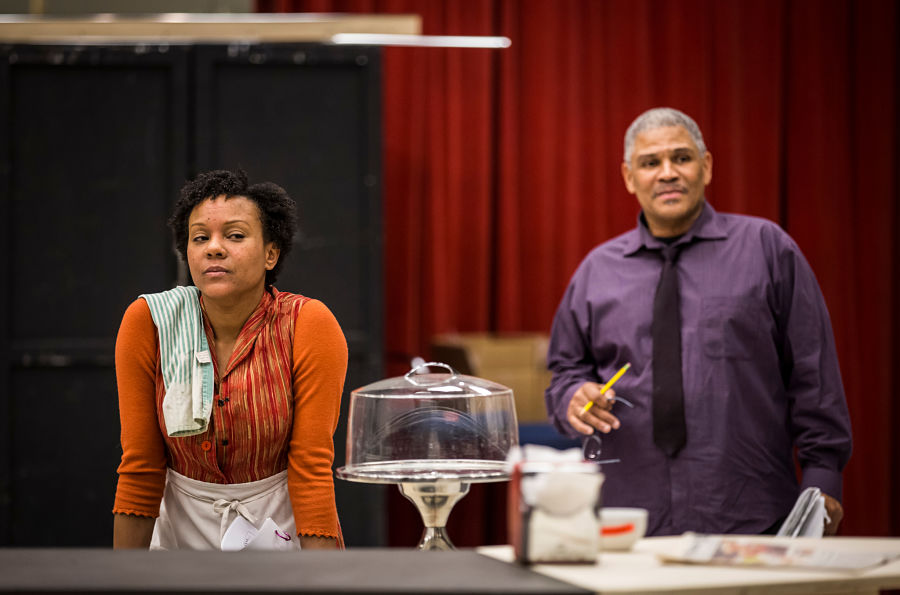CHICAGO: August Wilson’s blistering 1996 keynote address to the Theatre Communications Group National Conference in Princeton, N.J., “The Ground on Which I Stand,” became so celebrated as a cri de coeur for the importance of black voices in American drama that PBS chose the same title for its “American Masters” documentary on Wilson that aired in February. Undeniably, Wilson was a pioneer in negotiating the sometimes incompatible worlds of black-specific theatres and largely white-dominated (and better-funded) regional nonprofit houses.
Now Chicago’s Goodman Theatre is honoring that legacy by building bridges to communities that are too often overlooked. The company’s “August Wilson Celebration” kicks off March 7–April 18 with a major revival of Wilson’s Two Trains Running, directed by Goodman resident director Chuck Smith.

A founding member of the now-defunct Chicago Theatre Company, one of the first African-American companies to arise in the city during the explosion of off-Loop theatre in the late 1960s and ’70s, Smith is doing more than directing the celebration’s centerpiece production. He’s also the chief instigator and curator for this reexamination of Wilson’s legacy, working closely with Wilson’s widow, Constanza Romero.
The celebration includes one-night-only staged readings of the other nine plays in Wilson’s Century Cycle examining 20th-century African-American life. The readings will be held at venues throughout Chicago, with a special emphasis on those in traditionally black South Side neighborhoods, such as the Pullman Museum in the historic Pullman district and Chicago State University in the Roseland community. Additional events will include actor/playwright Ruben Santiago-Hudson performing Wilson’s autobiographical solo How I Learned What I Learned; a first-time presentation of Wilson’s poetry, presented in association with the Poetry Foundation of Chicago and featuring the ensemble Universes; and panels and discussions on Wilson’s legacy and the state of black theatre in America in 2015—a year which marks what would have been the playwright’s 70th birthday, and the 10th anniversary of his death.
With its 2007 production of Radio Golf, the Goodman became the first theatre in the world to produce all of Wilson’s work, and held a Wilson fest then to mark the occasion.
That festival, says Smith, was “about his life in Pittsburgh and his friends and acquaintances there. We got to the point where he left Pittsburgh.” The new fest is “designed to take it from that point on.”
Smith goes on to note that Wilson’s long association with St. Paul’s Penumbra Theatre Company “is where the August Wilson style really got refined. I happened to see a production of Fences at Penumbra in 1991, and it contained all the things that made August Wilson special—the nuances, the cadences. And I realized, ‘Oh, he was working with these guys for three years and developing that whole style.’ That’s a story that very few people know about.”
Willa Taylor, the Goodman’s director of education and community engagement, notes that even within black communities, Wilson isn’t as well-known as he should be.
“One of the driving forces of this whole celebration is to try to get August Wilson taught in schools. The issue for teachers is around the culture and the language,” Taylor explains. “If you’re a Chicago public schoolteacher, chances are that you don’t look like the students that you teach and you don’t live in the neighborhood where you work. Teachers are very threatened—I think rightly so—by the language of his work, and by not having enough familiarity with the culture in which the plays are set.” In order to address this, Taylor organized a workshop on teaching Wilson in conjunction with Wilson scholar Sandra Shannon of Howard University.
As a man standing his ground in both black-specific theatres and large regional houses, Smith says he wants the August Wilson Celebration to make the playwright accessible to everyone. “Culturally specific theatre is a double-edged sword,” he notes. “There is no way you can please everyone on this issue. For myself, I say it’s like jazz—jazz is definitely an African-American art form, but white people play jazz, and play it well. The point is, I don’t think there is any way we as African Americans can say, ‘Well, no, white people can’t direct our plays.’” But, he adds, “They’ve got to know the landscape.”


